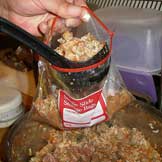
Hydrangeas are plants with broad, flat leaves and large flowers that come in a variety of colors, like pink, red, purple, blue and white. While undoubtedly beautiful, are hydrangeas poisonous to dogs and cats?
Technically, the answer is yes, but before you panic and toss your beautifully potted hydrangea bush in the trash or clear them out of your garden, there are a few things you should know.
Find out how hydrangeas can affect dogs and cats and what you will need to do if your pet decides to nibble on one.
What Makes Hydrangeas Poisonous to Pets?
According to the Pet Poison Hotline, the leaves, flowers and buds of the hydrangea plant contain a chemical known as amygdalin.
Amygdalin is a cyanogenic glycoside found in many plants. In its natural form, amygdalin is not toxic; however, when it is metabolized by the body (whether it be human, dog or cat), it produces cyanide, which can be toxic to mammals. All parts of the hydrangea plant contain amygdalin, but the highest concentrations are believed to be in flowers and young leaves.
Hydrangea poisoning is dose-dependent. That means that your pet must eat a certain amount of the plant in order to show signs of poisoning. Smaller pets are at a higher risk of poisoning simply because they have to consume less than larger pets do to become sick.
The good news is that hydrangea poisoning in dogs and cats is rare, because a very large amount of hydrangea has to be consumed for pets to manifest symptoms. Since symptoms are usually mild, cases often go unreported.
Symptoms of Hydrangea Poisoning in Pets
The most common symptoms associated with hydrangea poisoning are related to the gastrointestinal tract. Dogs or cats that consume enough hydrangea leaves, flowers and/or buds can suffer from vomiting and diarrhea. In severe cases, hydrangea poisoning can cause lethargy, depression and confusion.
What to Do If Your Pet Has Hydrangea Poisoning
Signs of hydrangea poisoning occur within about 30 minutes after ingestion. If you notice any of the above symptoms after your pet has been playing near or sniffing a hydrangea bush, call or take your pet to your veterinarian immediately.
Bring a sample of the plant with you, including leaves and flowers, so your veterinarian can properly ID the plant. Your veterinarian will ask you some questions and perform a physical exam. Since poisoning can mimic other conditions, your veterinarian may also run some tests to rule out other problems. Tests may include bloodwork and a urine test to make sure your pet’s organ function is normal, as well as x-rays to rule out other causes of digestive problems.
Follow all your veterinarian’s recommendations to get your pet back to good health.
Treatment of Hydrangea Poisoning in Pets
Treatment of hydrangea poisoning depends on several factors, including the severity of the symptoms and the size, age and overall health of your pet.
Timing of ingestion of the hydrangea may also influence treatment. If it was within 30 minutes, your veterinarian may recommend inducing vomiting to remove the poisonous plant from your pet’s system.
In severe cases, treatment can include hospitalization for monitoring as well as intravenous fluid therapy to flush out toxins, correct dehydration from diarrhea and/or vomiting, and provide support for your pet.
Treatment for gastrointestinal issues, including medication and a bland diet, may also be prescribed. Once the vomiting and diarrhea have run their course and the toxin has been eliminated from your pet’s system, prognosis is excellent.
If your pet has ingested any part of a hydrangea bush, the sooner your pet receives medical attention, the better the prognosis is and the higher the chance of a full recovery.
The best way to prevent hydrangea poisoning is to avoid keeping the plant where your pet can access it. If you choose to have hydrangeas, keep the plants at a height that your pet can’t reach and be sure to remove any leaves or flowers that fall off the plant. If you have cats, cover the plants with netting to prevent access, or move the plant to a room that’s off limits for your cat.
Pet-Safe Alternatives to Hydrangeas
If you want a pet-safe alternative to hydrangeas, consider the following list:
-
Marigolds
-
Petunias
-
Tiger orchid
-
Roses
-
Burro’s tail
-
African violets
-
Bamboo
-
Sunflowers
-
Fern (Boston fern, rabbits foot fern)
-
Black haw
-
Camellia (common or mountain)
-
Pansy orchid
-
Snapdragons (common or withered)
-
Zinnias
-
Sage
By: Dr. Sarah Wooten
Featured Image: iStock.com/ooyoo










